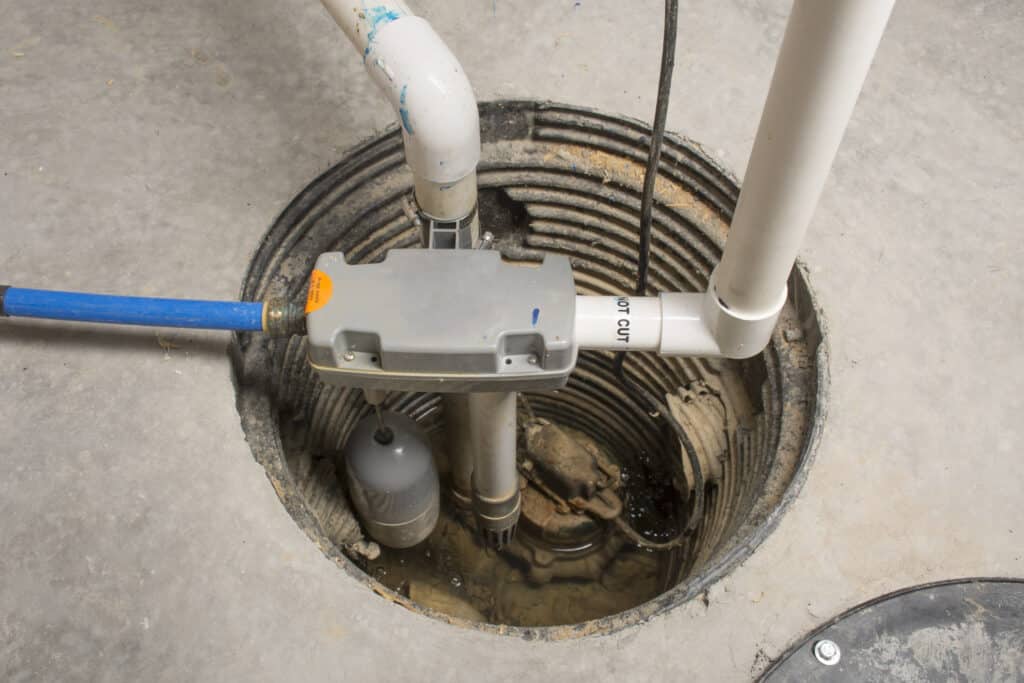
Handling Sump Pump Issues in Coastal Areas
If you live in coastal areas like Conway, SC, you might have sump pump issues because of high humidity and groundwater levels. This can cause the pump to run all the time and get clogged by debris. To keep your pump working well and manage floods, do regular maintenance, install it right, and deal with any power loss.
Common Sump Pump Issues in Conway, SC
Are sump pump problems putting your Conway, SC home at risk?
In coastal areas like Conway, high groundwater levels and humidity can overwhelm sump pumps.
These devices work hard to stop basement floods by managing water from nearby water tables.
But sump pump issues pop up when a sump pump runs all the time.
This happens because of too much moisture as the pump keeps working to handle incoming water—a common issue in our coastal area.
Sump pump issues can arise because sump pumps have an automatic level control, allowing them to work on their own.
However, in places like ours, debris can block float switches and cause significant problems.
Clogs are more common near the coast due to environmental factors.
Regular maintenance and checks ensure your sump pump works right and help prevent these problems.
Homeowners need to know the challenges in Conway, SC, to protect their belongings.
For expert help with sump pump issues, consider reaching out to Benjamin Franklin Plumbing of Myrtle Beach, SC.
They provide professional and reliable plumbing help for the Conway area.
Take action to keep your home safe and enjoy peace of mind in the unpredictable coastal conditions.
Why Do Sump Pumps Fail in Coastal Areas?
Ever wonder why Sump Pump Issues arise more often in coastal places like Conway, SC?
A big reason is the battle with high humidity and groundwater levels.
In coastal spots, these factors can break sump pumps by pushing them past what they can handle.
High moisture wears them down and causes them to fail early.
Plus, saltwater is another problem.
It corrodes metal parts in the pump, cutting its performance and lifespan.
It’s a slow attacker, weakening the pump over time.
To fight these problems, it’s key to use salt-resistant materials and strong pump designs.
Regular upkeep, like cleaning and checking the pump, is also important in humid spots.
Homeowners should make sure their drainage systems lower the groundwater pressure on the pump.
Benjamin Franklin Plumbing of Myrtle Beach, SC, advises getting your sump pump checked once a year to handle these issues well.
If you’re in Conway, taking proactive steps can protect your home from the constant coastal challenges.
Remember, a little prevention today can save you on repairs tomorrow!
Spotting Overwhelmed Sump Pumps
Is your sump pump having a hard time during heavy rain in Conway, SC?
Knowing how to identify Sump Pump Issues is key to keeping your home safe from water damage.
This is especially true in coastal areas with high humidity and groundwater.
An overwhelmed pump often runs nonstop, which means it’s working too hard to keep up with incoming water.
Listen for odd noises like grinding or rattling—these can be signs that the pump is under strain.
Another clue is if the pump keeps turning on and off, which means it might not handle the water well.
If you notice these Sump Pump Issues, take action quickly.
First, check the power source to make sure it’s working right.
Look at the pump’s float switch, as dirt can block it and keep the pump running non-stop.
Remove any dirt or sediment in the sump pit.
If the problem continues, it might be time to call a professional.
The weather in Conway, SC, brings unique challenges, but knowing these signs can protect your home.
For lasting peace of mind, think about reaching out to specialists like Benjamin Franklin Plumbing of Myrtle Beach, SC.
They understand coastal issues and offer solutions tailored to your needs.
Fixing Sump Pumps That Won’t Stop Running
Is your sump pump going nonstop?
In Conway, SC, it’s common for sump pump issues to arise due to high humidity and groundwater, causing pumps to run without pausing.
This might mean something is wrong.
A common issue is a switch getting stuck, often because debris blocks it, keeping the pump on all the time.
To fix these sump pump issues, first check the float switch.
Debris can stop it from turning the pump off.
Clean out the sump pit so the float moves freely.
If that doesn’t help, the float switch or pump might need replacing.
Also, think about power surges or electrical issues.
Check for tripped circuits, which can make the pump act up.
If you need to replace your pump, pick one that can handle Conway, SC’s coastal conditions.
Look for durable models that resist high moisture and saltwater.
Regular maintenance will keep it working well and avoid unwanted surprises during storms.
Protecting your home is always worth it.
Troubleshooting Sump Pump Power Loss
Having Sump Pump Issues can be a real hassle.
Why do sump pumps fail when you need them most?
In Conway, SC, coastal weather can affect these pumps.
Heavy storms and high humidity can cause electrical shorts, stopping your sump pump.
Power outages during bad weather also leave them useless when you need them to stop floods.
To keep your pump working, take preventive steps.
Consider options that keep it running during power cuts.
Check your sump pump’s power connections for rust or loose wires to avoid sudden shutdowns.
Clean and secure the area around the power supply to protect against moisture problems.
Good performance needs constant care.
Regular check-ups by experts like Benjamin Franklin Plumbing of Myrtle Beach, SC, can catch issues before they become big problems.
Their skill with plumbing in coastal areas ensures your sump pump is ready when needed, offering peace of mind in tricky weather.
Fixing Clogged Sump Pumps and Switches

Are you having trouble with Sump Pump Issues in Conway, SC?
Clogs are a common issue.
In coastal areas, high humidity and debris can mess with sump pumps.
Dirt, sand, and small rocks can get into the system, causing blockages that might lead to overflow or pump failure.
Spotting early signs like strange noises or less water being pumped out is important.
Since sump pumps keep basements from flooding by managing groundwater, the float switch that controls the on-off cycle can get stuck with muck.
This blockage can disrupt the cycle and overload the pump.
To avoid these Sump Pump Issues, regular upkeep is crucial.
Check your sump pump every few months.
Clear out any debris around the sump basin and make sure the water going in is clean.
Think about adding a mesh filter to stop larger particles.
Also, check the discharge line; a quick spray with a garden hose can help.
By keeping your sump pump free of debris, you make it work better and last longer, protecting your home from water damage.
Fixing Frozen or Blocked Discharge Lines
Ever notice your sump pump in Conway, SC, stops working when it gets cold?
Frozen or blocked lines might be why!
Listen for gurgling sounds or check if no water is coming out—these are signs of ice blockage.
This happens a lot in coastal areas where temperatures fluctuate, causing lines to freeze and thaw.
Sump pump issues like these can be prevented easier than you think.
Wrap the discharge line to keep it from freezing so your pump works well.
Sometimes, heaters along the line can help stop ice from forming.
Also, using a bigger pipe or a backup line during installation lets water flow even if one gets blocked.
If the blockage won’t clear, use a plumbing snake to remove debris or ice.
You can also pour hot water or use heat tape along the line to melt any ice.
Remember, check the lines before winter hits.
Be proactive, and your sump pump will keep fighting against water logging, even in the worst storms!
When a Sump Pump Works but No Water in the Pit
Ever wonder why your sump pump runs but there’s no water in the pit?
This common Sump Pump Issue can confuse homeowners, especially in places like coastal Conway, SC.
The problem might be a “dry pit condition,” which happens when something blocks the water from reaching the sump.
This could be due to blocked drain tiles or systems that aren’t set up right, making water miss your sump pit.
To fix this, first, check the drainage system for any blockages or pipes that don’t line up right.
These problems often come from dirt buildup or small debris, common in wet soil areas like Conway.
Make sure the system’s inlets are clear so water can flow into the sump pit without a hitch.
If these steps don’t fix it, it might be time to call Benjamin Franklin Plumbing of Myrtle Beach, SC.
Their skilled team can carefully check your setup and fix any hidden problems.
Getting a professional assessment can change your sump pump from puzzling to a reliable protector against surprise water issues.
So, stay on top of things and ensure everything works just right!
Improving Flood Prevention
Looking for ways to shield your Conway, SC home from unexpected water damage?
Start by making your sump pump system more efficient.
Adding a battery backup ensures your pump keeps working even when the power’s out—a common problem during strong coastal storms.
Next, think about adding a drainage system to move extra water away from your foundation before it gets to your sump pit.
Addressing potential Sump Pump Issues helps your sump pump work less and reduces the chance of flooding.
Pair this with regular cleaning of gutters and downspouts to stop debris buildup and avoid overflow.
Also, consider setting up a sump pump alarm.
It warns you about Sump Pump Issues before they get worse, giving you time to act.
Lastly, get professional advice for tips tailored to your home and weather conditions.
Experienced plumbers like Benjamin Franklin Plumbing of Myrtle Beach, SC, can give you peace of mind and long-lasting protection against Conway’s unpredictable coastal weather.
How to Pick the Right Sump Pump
Are you feeling lost with all the sump pump options out there, especially if you live in a place like Conway, SC?
Picking the right one means knowing what you need and the conditions you face.
It’s crucial to understand common Sump Pump Issues that might arise in your area.
First, decide if you need a submersible or pedestal pump.
A submersible pump works well in tight spots and is quieter, while a pedestal pump may be more affordable but could be louder.
Think about how much power you need.
In places with high water levels, like near the coast, you might need a stronger pump to handle extra water.
Also, look at the material; cast iron or stainless steel pumps last longer, especially when there’s saltwater around, which can contribute to potential Sump Pump Issues.
Don’t forget a battery backup.
Power can go out during storms in Conway, and a backup keeps your pump running.
Talk to experts like Benjamin Franklin Plumbing of Myrtle Beach, SC, who know coastal issues and can suggest what works best for your home.
By addressing Sump Pump Issues beforehand and with the right pump, you get solid protection from water and peace of mind, no matter the weather.
Benefits of Regular Sump Pump Care
Ever wondered why you need to keep up with sump pump care?
In places like Conway, SC, it’s not just wise—it’s a must.
The high humidity and frequent groundwater can strain systems, leading to Sump Pump Issues that cause them to run non-stop or, even worse, fail when you need them most.
Regular check-ups can spot problems before they turn into big and costly fixes.
Regular sump pump care means checking the battery backup, cleaning the sump pit, and making sure the discharge line isn’t clogged—this is common in coastal areas where saltwater can make clogs worse.
A well-kept pump helps prevent basement floods, especially in areas with high water tables that can lead to dampness.
In the end, routine care gives you peace of mind by making your system last longer and cutting down on unexpected breakdowns.
Whether you make small fixes yourself or rely on the pros, keeping up with pump maintenance can save you big headaches.
If you’re not keen on doing it yourself, hiring experts like Benjamin Franklin Plumbing of Myrtle Beach, SC, ensure you’re ready to address Sump Pump Issues in the tough conditions of Conway.
How Professionals Fix Sump Pumps
Ever wonder how pros fix sump pumps so well?
Experts like Benjamin Franklin Plumbing of Myrtle Beach, SC know just what to do, especially in coastal areas like Conway, SC.
When you call them, they start with a good look at the whole system to find the cause of the problem.
They check everything, from the motor to the discharge lines.
If your sump pump runs all the time or has lost power, they can quickly figure it out and fix it, getting it back to work smoothly.
Expert technicians aim to stop future Sump Pump Issues too.
They provide solutions that fit coastal challenges, like high humidity and saltwater risks.
They’ll check your sump pump’s automatic level control to make sure it’s not blocked by junk, which happens a lot in the area.
Hiring pros has big perks.
They not only fix Sump Pump Issues but also help your system last longer.
They focus on maintenance, making sure your sump pump works well no matter the weather.
So, if you have sump pump troubles, count on the pros to keep your home safe from water damage.
FAQs

What are the common signs of sump pump failure?
Look out for odd noises, nonstop running, and water pooling in the basement. If your sump pump makes strange sounds or keeps running, it might indicate Sump Pump Issues that need a check-up.
How often should I check my sump pump in Conway, SC?
Check your sump pump every few months, especially before the rainy season. Regular checks make sure it’s working well and ready for emergencies.
Can I fix Sump Pump Issues on my own?
You might tackle small issues like cleaning out debris, but leave bigger repairs to the pros. Hiring experts like Benjamin Franklin Plumbing of Myrtle Beach, SC, ensures lasting fixes and fewer hassles later.
Why does my sump pump run non-stop but no water comes out?
This might be due to a faulty float switch or a blocked discharge line. You may need to reset the pump or get a pro to figure it out and fix it.
What maintenance steps can stop sump pump clogs?
Regularly clean the sump pit and clear any debris around the float switch. It’s also a good idea to test the sump pump now and then, especially in the humid, clog-prone coastal areas like Conway, SC.

 843.213.6611
843.213.6611